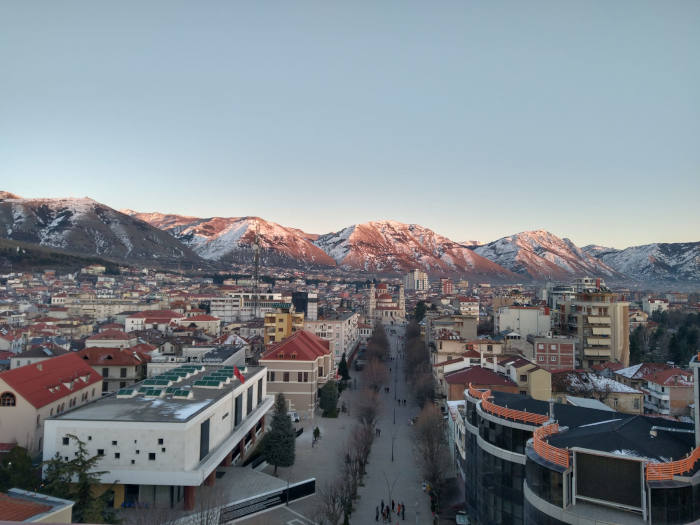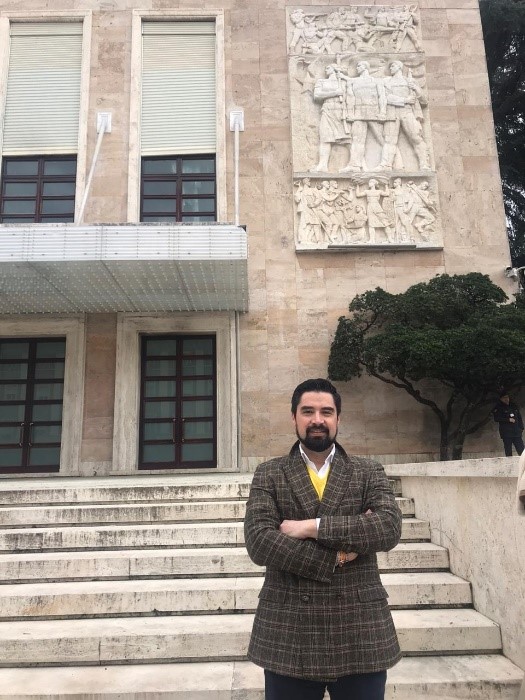-
13 August 2020
Category : Interview
Cooperation: an opportunity for exchanging solutions to problems that affect us all
The coordinator of the European competence cooperation project in Albania tells us about the last few months of work in the midst of the health crisis.

Alberto Herrera, coordinator of the Twinning cooperation project financed by the EU “Strengthening of the competition authority in Albania”, shares his view from this country on the current context caused by COVID19. He tells us how the project has managed to rapidly adapt the training and activities to the new situation, without sacrificing the results. He also talks about the importance of monitoring competition in the midst of a health crisis and cooperation as the cornerstone to promote exchange between specialists.
What is the project about and what difficulties have arisen with the pandemic?
The project that I coordinate is a Twinning project funded by the European Union and carried out by the National Commission for Markets and Competition (CNMC) and the FIIAPP. The aim of the project is to ensure the protection of free competition in Albania through training activities between Spanish experts and their Albanian counterparts, which until the pandemic began required the presence of Spanish experts in the country.
The COVID19 outbreak and the resulting social distancing and confinement measures imposed both in Spain and Albania caught us totally off guard, I suppose like everyone else. This meant that planned activities had to be cancelled, as the experts were unable to travel from Spain, which plunged us into great initial uncertainty.
However, this did not result in a shutdown of our office in Albania’s activities, from where, from the outset and working from home , we focused our efforts on analysing the most appropriate strategies to ensure the continuity and achievement of project goals, coordination between all parties for an adequate design and re-planning of activities and the reconsideration of the communication strategy.
What security measures were established in Albania? How has the project work been adapted to the situation?
In Albania, measures were taken similar to those in the different neighbouring

countries and in the states of the European Union: confinement of the population, curfews at certain times of the day, closure of land borders, interruption of regular air and sea passenger transport services, suspension of activities for a large part of the public and private sector institutions and the closure of sports, cultural and leisure facilities.
However, once the situation in Albania improved, with the return to office work in mid-April, the project decided on how to resume activities with the aim of achieving the same results as those obtained face-to-face.
Based on this condition, as well as taking into account the preferences and needs of our beneficiary, from the project we suggested the possibility to institutions of going beyond the on-line teaching of master classes and organising e-learning in a form similar to those used by many universities and companies.
Finally, the chosen platform was Moodle, made available by the FIIAPP and which allows the development of interactive training from the didactic materials prepared by the CNMC experts.
Has the pandemic affected the subject on which the project is working?
Since the start of this crisis, the main goal of the European Commission and the Competition Authorities of the Member States, such as the National Commission on Markets and Competition (CNMC) in Spain, has been to ensure that essential products to protect consumer health against the virus, such as masks and gels disinfectants, should continue to be available at competitive prices.
Investigations aimed at discovering and sanctioning anti-competitive agreements between operators or abuses by companies with a dominant position in sectors sensitive to the health crisis have become a priority for the Competition Authorities in our surroundings, and in Albania too.
In line with these objectives, and with the purpose of contributing to the fight against the pandemic in Albania within the scope of our project, we launched an interesting initiative that has allowed us to deepen the collaboration given to our beneficiary.
This consisted of the CNMC making non-confidential information available to the Albanian Competition Authority regarding the actions and investigations carried out by the it with the aim of protecting consumers. One example was the launch of a mailbox to centralise complaints and queries related to the application of competition rules in the context of COVID19 or the initiation of investigations in the markets producing and distributing health care or funeral services.
Why is it important, at a difficult time like this, that cooperation should not stop?
In these difficult times in which the notions or values of transnationality and universal citizenship are being questioned, cooperation between countries becomes even more meaningful – the exchange of experiences, technical and managerial knowledge established within the framework of technical cooperation projects like ours works both ways. Both ways because it not only works in favour of the beneficiary country, but is also enriching for the implementing country. Therefore, in adverse circumstances, international cooperation offers a unique chance to exchange solutions to problems that affect us all.
What is the current situation in Albania? And that of the project?
Although there were infections, the effects of the disease in Albania were less widespread than those of Western Europe. The country has worked to reactivate its activity and economy, and the measures taken have been gradually lifted, but naturally with the adoption of the necessary precautions.
Regarding the project, the parties involved have agreed on a two-month extension, which is approximately the time for which the activities have been suspended, to allow the completion of what had been planned.
How has the relationship with the FIIAPP been at this difficult time?
Since the beginning of this crisis, there has been constant concern and coordination from the FIIAPP, firstly, to guarantee the safety of those of us abroad and secondly to ensure the continuity of the projects, given the importance of cooperation for the parties involved, as I have said before.
Once the parties to the project agreed on the resumption of on-line activities, the support of the FIIAPP, by making the Moodle platform available to the project, was decisive to guarantee optimal results, as well as the technical support and collaboration of the Department of Knowledge Management responsible for it.
The commencement of activities in e-learning format would certainly not have been possible without the support and intervention of Knowledge Management, which loaded the didactic content onto the platform.
Despite everything negative that the pandemic has brought, is there anything positive that you can draw from the situation?
Unfortunately, I feel unable to draw any positive consequences from the whole situation. Perhaps, after a time and with some hindsight, it might be possible to make a constructive reflection on all this, not limited to the repetition of clichés and stock phrases.
I personally believe that this health crisis has placed us in a very complicated situation, with a scope and consequences as yet unseen. Not only has it caused the pain of all those who have lost a loved one, but it has also deprived many people of their livelihood, putting them in a situation of economic and labour uncertainty and precariousness.
For long periods of time, a large part of the population has been subject to great pressure and stress as a consequence of the confinement and social distancing measures taken by different governments, with subsequent harm to physical and mental health.
Neither should we sight of the curtailment suffered by principles, values and rights that we believed unquestionable in democratic societies. For example, the rights of assembly and freedom of movement, among others. I am sorry I cannot offer a more positive view, but as of today, I do not believe that these events will contribute to improving our world or making us better people.
The views and opinions expressed in this blog are the sole responsibility of the person who write them.




